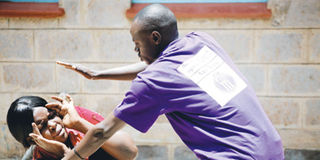The Ghana Statistical Service, GSS has revealed that two in every five women aged 15 to 49 years, which represent 41.6 percent who have ever had an intimate partner are said to have experienced at least one form of intimate partner violence (IPV).
This was contained in preliminary findings from the upcoming 2022 Ghana Demographic and Health Survey (GDHS) Report. This violence includes emotional, physical, or sexual violence.
The GSS made this known in its preliminary statistics on violence against women.
The service revealed that 35.2 percent of these women had experienced emotional violence at least once; 22.7 percent had experienced physical violence at least once, and 11.2 percent had experienced sexual violence at least once.
More than half (53.4%) in the Savannah Region had experienced IPV, the highest recorded, followed by the Central (44.0%), Ahafo (44.0%), and Volta (43.6%) regions.
The lowest rate of IPV was recorded in the Bono Region (26.3%). More than two in every five with primary education (44.1%) or no education (42.9%) had experienced IPV, almost twice that of women with more than secondary education (23.0%).
IPV experience varies by employment status as well. Women employed for cash reported the highest frequency of IPV (39.5%), about 10 percentage points higher than women employed but not for cash (28.9%) or not employed at all (29.1%).
The most frequent form of sexual violence was being forced to have sexual intercourse (8.2%), for physical violence being slapped (11.6%) was most frequently experienced, and for emotional violence, it was being insulted or made to feel bad about herself (27.1%),” the GSS further stated.
“Further, one in every ten (12.2%) women in this age group reported experiencing physical violence often or sometimes in the 12 months preceding the survey, and 6.8 percent experienced physical violence while pregnant. Central Region (44.6%) had the highest percentage of women who had experienced physical violence since age 15 followed by the Savannah (42.9%) and Volta (40.2%) regions. The lowest rates of physical violence were recorded in Upper West (23.7%) and North East (23.7%) regions.”
About three in every five (63.2%) women who have experienced physical violence, reported the violence was committed by current (33.2%) or former (29.9%) husbands or intimate partners, the leading perpetrators of violence against women. Fathers (11.9%), mothers (11.9%), and siblings (10.4%) were the next highest categories of persons committing physical violence.
Women also reported physical violence from non-relatives including teachers (4.9%), schoolmates (4.6%), employers or work colleagues (1.0%), and other persons (6.1%),” it said.
One in five women in the Volta (22.3%), Central (19.6%) and Savannah (19.6%) regions reported ever experiencing sexual violence, the highest recorded. Progress toward eliminating violence against women has been slow in the past decade. Between 2008 and 2022, experience of physical violence since age 15 declined from 36.6 to 33.2 percent experience of sexual violence declined from 18.8 to 14.4 percent, and physical violence against pregnant women increased from 5.2 percent to 6.8 percent.















